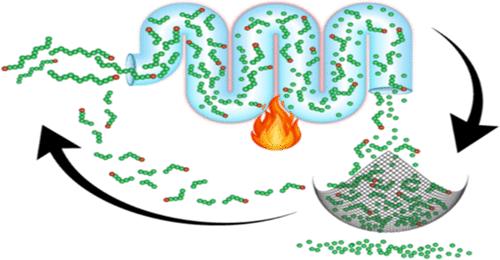Accelerated Continuous Flow Depolymerization of Poly(Methyl Methacrylate)
IF 14.4
1区 化学
Q1 CHEMISTRY, MULTIDISCIPLINARY
引用次数: 0
Abstract
A continuous flow setup comprising an inline dialysis unit for immediate monomer removal is used for the depolymerization of poly(methyl methacrylate) (pMMA), synthesized via reversible addition–fragmentation chain transfer (RAFT) polymerization. The approach used allows one to carry out solution depolymerizations at much higher polymer content compared to batch processes while maintaining high depolymerization conversions. pMMA is efficiently depolymerized in the flow reactor, yielding up to 68% monomer recovery under catalyst-free reaction conditions at 160 °C, starting from a 1 molar repeat unit concentration, which is a 20-fold improvement compared to previous batch studies. This was achieved by using the inline dialysis to continuously remove monomer from the depolymerization solution and hence continuously shifting of the depolymerization equilibrium to the recycling side. Depolymerizations at various temperatures, starting polymer concentrations, and reactor setup modifications are investigated, clearly showing the highly advantageous effect of the monomer removal on the reaction. The employed approach represents a significant advancement toward the industrial feasibility of depolymerization of methacrylates by lowering the solvent use, expanding its temperature operation window, and bringing polymer contents to a practically relevant level.

求助全文
约1分钟内获得全文
求助全文
来源期刊
CiteScore
24.40
自引率
6.00%
发文量
2398
审稿时长
1.6 months
期刊介绍:
The flagship journal of the American Chemical Society, known as the Journal of the American Chemical Society (JACS), has been a prestigious publication since its establishment in 1879. It holds a preeminent position in the field of chemistry and related interdisciplinary sciences. JACS is committed to disseminating cutting-edge research papers, covering a wide range of topics, and encompasses approximately 19,000 pages of Articles, Communications, and Perspectives annually. With a weekly publication frequency, JACS plays a vital role in advancing the field of chemistry by providing essential research.

 求助内容:
求助内容: 应助结果提醒方式:
应助结果提醒方式:


